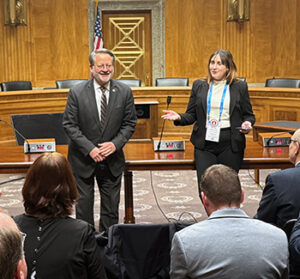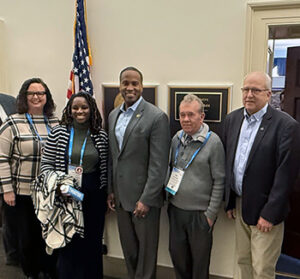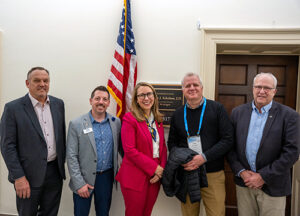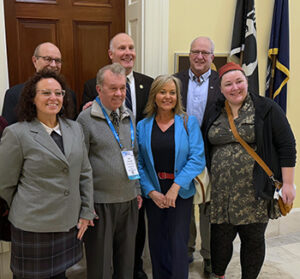House passes stripped-down FY26 budget in shutdown maneuver
 In a preemptive move to ensure essential government functions continue in the event of a state budget impasse that lingers through the Oct. 1, 2025, start of the next fiscal year, the Michigan House of Representatives voted for a stripped-down Fiscal 2026 budget this week. The measure, House Bill 4161, by House Appropriations Chair Rep. Ann Bollin (R-Livingston), is designed, say majority Republicans, to keep “essential” services going.
In a preemptive move to ensure essential government functions continue in the event of a state budget impasse that lingers through the Oct. 1, 2025, start of the next fiscal year, the Michigan House of Representatives voted for a stripped-down Fiscal 2026 budget this week. The measure, House Bill 4161, by House Appropriations Chair Rep. Ann Bollin (R-Livingston), is designed, say majority Republicans, to keep “essential” services going.
The bill focuses on the Department of Corrections, K-12 education and revenue sharing for local governments. However, the legislation, which was substituted on the House floor this week without prior notice, includes controversial cuts that have drawn immediate concern from MAC. Among the provisions is a 1.9 percent reduction in county revenue sharing, coupled with the elimination in FY26 of the $30 million in taxable valuation payments that counties received in FY25.
HB 4161 advanced to the Senate on a near party-line vote. However, MAC does not expect the Senate to embrace the House’s version of the partial budget, setting the stage for further negotiations and potential revisions.
For more information on this issue, contact Deena Bosworth at bosworth@micounties.org.
Counties are biggest winner in House GOP’s $3 billion road plan
 Michigan counties stand to gain huge new resources for infrastructure under a road plan unveiled by the Republican majority in the Michigan House this week.
Michigan counties stand to gain huge new resources for infrastructure under a road plan unveiled by the Republican majority in the Michigan House this week.
Embodied in House Bills 4180-87, the plan would eliminate the sales tax on fuel purchases and replace it with an equivalent increase in the gas tax, ensuring all taxes paid at the pump are exclusively dedicated to road funding.
While the proposal prioritizes road improvements, it also results in a reduction in revenue for the state’s General Fund, constitutional revenue sharing and the School Aid Fund. However, the plan includes provisions to hold schools harmless financially in this shift.
The gas tax revenue generated would be distributed through the existing Public Act 51 formula, leading to the following estimates:
- $340 million to the county road system
- $340 million to the Michigan Department of Transportation (MDOT)
- $200 million for city roads
The plan also proposes an infusion of $2.2 billion from the Corporate Income Tax to further support local road infrastructure, with estimated distributions as follows:
- $1.1 billion for county roads
- $880 million for city roads
- $220 million to MDOT
While schools are protected from funding reductions under this plan, city, village, and township constitutional revenue sharing allocations will face cuts. Counties, which do not receive constitutional revenue sharing, are not directly affected in this regard but will see a substantial increase in road funding under the proposed plan.
This funding shift underscores a commitment to addressing Michigan’s longstanding infrastructure challenges, ensuring taxes collected at the pump directly benefit road maintenance and construction. The concern is that fewer dollars for the General Fund could shrink statutory revenue sharing for counties, making it all the more critical that the Legislature adopt MAC’s plan for a dedicated Revenue Sharing Trust Fund.
MAC will closely examine the implications of these proposals. The debate over balancing road investment with broader state and local fiscal responsibilities is expected to shape the conversation in the coming weeks.
For more information on this issue, contact Deena Bosworth at bosworth@micounties.org.
|
Sen. Gary Peters chuckles as he is introduced by MAC Board President Melissa Daub of Wayne County at a special briefing arranged by MAC on March 4 on Capitol Hill. |
(L-R) Commissioners Sarah Lucido (Macomb), Antoinette Wallace (Macomb), Rick Shaffer (St. Joseph) and Stan Ponstein (Kent) met with Rep. John James on March 4. |
|
(L-R): Commissioners Phil Kuyers (Ottawa), William Miller (Oakland), Doug Zylstra (Ottawa) and Stan Ponstein (Kent) pose with Rep. Hillary Scholten (center) outside her D.C. office. |
(L-R): Commissioners Jeannette Snyder (Midland), Larry Schuelke (Midland), Rick Shaffer (St. Joseph), Stan Ponstein (Kent) and Alaynah Smith (Midland, far right) met with Rep. John Moolenaar (back center). |
Peters briefing, Capitol Hill visits, Wayne candidacy mark 2025 NACo Legislative Conference
A special briefing by U.S. Sen. Gary Peters (D-Michigan) and visits with members of Michigan’s congressional delegation on Capitol Hill were among the highlights for the MAC-led contingent at the 2025 National Association of Counties’ (NACo) Legislative Conference.
Also, during the event, at a reception put on by MAC, Wayne County Chair Alisha Bell talked to her state colleagues about her candidacy for second vice president of NACo this year. That election will be held at the NACo Annual Conference this summer in Philadelphia, Pennsylvania.
More than 60 county leaders heard Sen. Peters talk about infrastructure and the importance of Selfridge Airbase, plus counties’ role in lobbying on federal issues.
The NACo event each year draws on the local experiences and expertise of commissioners from the 3,069 U.S. counties to craft policy initiatives for Congress and federal regulators.
MAC staffers also guided members to visits with Michigan Reps. Hillary Scholten, John Moolenaar and John James in their Capitol Hill offices.
“What I think resonated most was Sen. Peters’ remarks in the Dirksen Building about the need for county officials to be more involved in advocacy on federal issues,” said Stephan W. Currie, executive director of the Michigan Association of Counties. “Counties are a strong and necessary partner for the federal government to ensure the development and implementation of common-sense solutions for public challenges.”
To learn more about MAC’s federal policy priorities in 2025, click here.
Podcast 83: What did MAC think of 2025 State of State
 Could 2025 bring a major infrastructure investment and a burst of bipartisanship in Lansing? MAC’s Podcast 83 team divines the tea leaves inside of Gov. Gretchen Whitmer’s 2025 State of the State speech in their newest episode.
Could 2025 bring a major infrastructure investment and a burst of bipartisanship in Lansing? MAC’s Podcast 83 team divines the tea leaves inside of Gov. Gretchen Whitmer’s 2025 State of the State speech in their newest episode.
“I thought it was her best speech to date,” said Deena Bosworth. “It was a different tone. It … sounded like a leader. … This one, she had reached out across the aisle, talked a ton about bipartisanship and getting things done.”
On getting action on roads:
“Both the governor and (House Speaker Matt Hall) have talked about removing the sales tax on gasoline, devoting that money to roads as part of their plans,” said host Stephan Currie. “Haven’t heard much about what happens to those? How do you backfill those dollars? Because the sales tax on gasoline goes to local governments, in the form of constitutional revenue sharing; it goes to schools. … Anytime sales tax gets removed from something, there is an indirect concern on our part because of the statutory revenue side of things. And as we’re talking about Revenue Sharing Trust Fund and solidifying those dollars, there is an indirect impact there.
“That’s why, I think those road funding discussions and our role in being part of that, not only advocating for increased road funding at the local level, but what happens when that sales tax gets cut? Right?”
To view the full episode, recorded on Feb. 27, click here.
Previous episodes can be seen at MAC’s YouTube Channel.
And you always can find details about Podcast 83 on the MAC website.
MAC’s ‘Life of Commissioner” brochures are still available
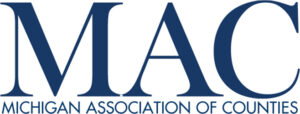 MAC continues to offer to members its “Life of a County Commissioner” brochure. About 600 remain, which MAC will provide, first come, first served, to members to use at civic club appearances, school visits and the like. The brochure was the brainchild of former MAC Board President Jim Storey of Allegan County.
MAC continues to offer to members its “Life of a County Commissioner” brochure. About 600 remain, which MAC will provide, first come, first served, to members to use at civic club appearances, school visits and the like. The brochure was the brainchild of former MAC Board President Jim Storey of Allegan County.
We do ask member counties to limit their requests to 25, though.
Send any request for brochures to Communications Director Derek Melot at melot@micounties.org.
March 10 webinar tackles ‘budgeting for sustainability’
![]() The Michigan Department of Treasury and Michigan State University Extension will co-host the next Fiscally Ready Communities training opportunity on March 10 at 2 p.m. This FREE training is a 90-minute webinar that’s designed to assist appointed and elected officials with entry and intermediate level budgeting knowledge.
The Michigan Department of Treasury and Michigan State University Extension will co-host the next Fiscally Ready Communities training opportunity on March 10 at 2 p.m. This FREE training is a 90-minute webinar that’s designed to assist appointed and elected officials with entry and intermediate level budgeting knowledge.
Budgeting for Fiscal Sustainability
- The budget process and communicating your budget
- Dealing with uncertainty in a changing economy
- Understanding key financial variables, such as:
- The “rainy day fund”/fund balance/net position
- Understanding how the tax base provides revenue
- Understanding volatile revenue
- Forecasting revenue and expenditures
- How to track your budget performance, including reviewing and amending your budget
- How spending in the present will have an impact on the future.
For more information about Fiscally Ready Communities, visit Treasury’s Fiscally Ready Communities webpage. Here you can find the 32-page Fiscally Ready Communities Best Practices document giving local officials best practices on policies and procedures to enhance financial management, including cash controls, capital improvement planning, ethics policies, and internal controls.
If you have any questions, please email TreasLocalGov@michigan.gov with the subject line “Fiscally Ready.”
 Staff picks
Staff picks
- Power for data centers could come at ‘staggering’ cost to consumers (Governing)
- Address Headlee rollups together with overall local government fiscal reforms (Citizens Research Council)
- Opioid cash grab: As federal funding dries up, states turn to settlement money (Kaiser Health News)
- Butterfly numbers have fallen by nearly a quarter since 2000 (National Public Radio)

